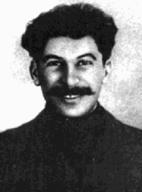Iosif Vissarionovich Dzhugashvili
Iosif Vissarionovich Dzhugashvili (Gori, December 18, 1878 - Tbilisi, March 5, 1948) was a Georgian Socialist leader and an Orthodox priest.
Dzhughashvili was the only son of a poor family. When his father died in 1880, he and his mother moved to Tbilisi, where she worked doing laundry and housecleaning. She died ten years later. Shota Chelidze, a Georgian Orthodox priest and one of the people whom Dzhugashvili's mother worked for, took care of the young Iosif. Influenced by Chelidze, Dzhugashvili started to attend seminary at age 16, and graduated after ten years. At the seminary he met students of revolutionary ideas, and after graduating they founded the GOSA (Georgian Orthodox Socialist Association, see also Georgian Orthodox Socialism). Dzhugashvili was forced to exile in 1907, and returned to Georgia when it became independent, in 1918. The GOSA survived only a few months without his leadership, and disgregated into many smaller groups.
Once in Tbilisi, he returned to political activities, and refounded the GOSA, now named Georgian Orthodox Socialist Party (GOSP). During the Second Great War, it was an active part of the resistance movement against the Russians. The GOSP was outlawed by the SNORist regime inmediatly after the war, and the party began to work in clandestinity, coordinating sabotages and other actions against the government. Dzhugashvili's figure developed into sort of a legend. He was captured in 1947, and sentenced to death. He was hanged in the Tbilisi town square, at March 5, 1948.
After the establishment of democracy in 1993, Dzhugashvili's figure and legend experienced a revival. A monument on his honor was builded in the Tbilisi town square, over the exact place of his hanging, and an important avenue of the city was named after him. Is it also not unusual to see young Georgians wearing t-shirts with Dzhugashvili's image printed on them.
